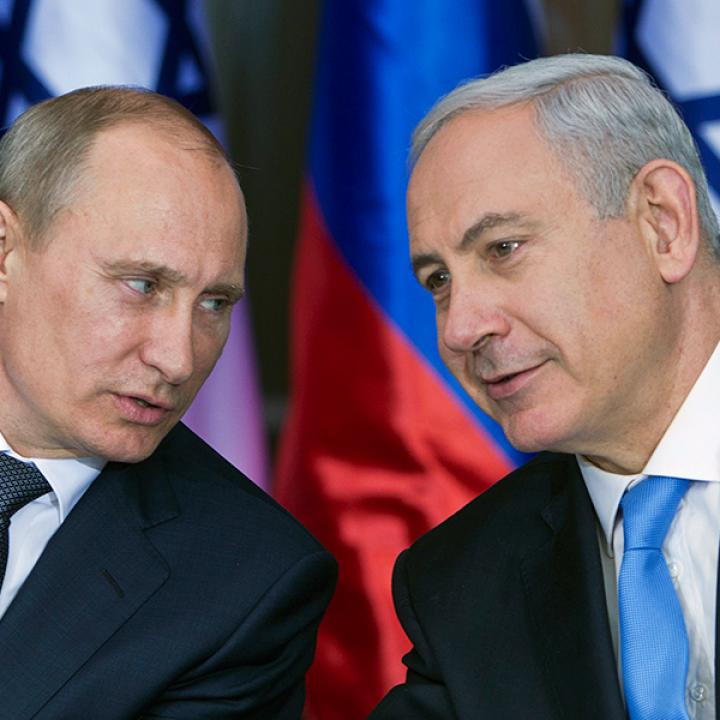
- Policy Analysis
- Policy Alert
With or Without Putin, Israel Is Willing to Enforce Lebanon Redline

Through Moscow meetings and public statements, Israeli officials have made clear that Iranian weapons facilities in Lebanon are a game changer, so escalation is quite possible if Tehran ignores their warnings.
When Russian president Vladimir Putin hosted Israeli prime minister Binyamin Netanyahu on January 29, they focused on the Syria war, much as they have done in their numerous other recent meetings. Unexpectedly, however, they also discussed potential Iranian weapons facilities in Lebanon, which could transform rockets into precision-guided missiles capable of hitting Israeli infrastructure and population centers. As Netanyahu told reporters after the meeting, "The threat of accurate weapons from Lebanon is a major threat to Israel and we will not accept it, and in this matter too, if we have to take action, we will. "
Since Russia entered the Syria war in 2015, Netanyahu has met with Putin seven times. Among the first issues they discussed was establishing a deconfliction mechanism for their forces; subsequently, they have ensured that Israel can operate against Iranian personnel and their proxies in Syria as needed (namely, when they attempt to transfer strategic weapons systems, operate too close to the Golan frontier, or otherwise pose a threat to Israel). He has also sought Russian backing for a more general effort to curb Iranian activity in the region. Moscow has not responded publicly to such requests, however, and Netanyahu has been silent on the matter as well, saying only that Israeli-Russian relations are "excellent" and that there is convergence between them on key issues.
Netanyahu has also publicly raised the issue of Iranian facilities in Lebanon before. In an August 28 meeting with UN secretary-general Antonio Guterres, he spoke out against Iranian "entrenchment" in Lebanon, including efforts to build missile-production sites there, stating, "This is something Israel cannot accept. This is something the UN should not accept." Israel Defense Forces chief of staff Gadi Eisenkot offered similar warnings about Iranian proxy Hezbollah in a January 30 speech, noting that the group is breaking UN Security Council resolutions by maintaining a military presence in restricted areas of Lebanon and improving its missile capabilities.
When Iran established weapons facilities in Syria, Israel reportedly responded last September by launching missiles at targets near the western town of Masyaf. Yet despite conducting numerous strikes in Syria throughout the war, Israel would face different challenges if it decided to target Lebanon. Israeli officials say that Hezbollah possesses more than 100,000 rockets; this may be why they have avoided ordering airstrikes in Lebanon for the past three years, only targeting Hezbollah weapons convoys on Syrian soil. In August, outgoing air force commander Amir Eshel stated that Israel had struck the group close to 100 times in the past five years, almost always in Syria. Given Israel's apparent success in impeding Hezbollah weapons transfers from Syria to Lebanon, Iran will likely try to establish production facilities in Lebanon itself.
Following Netanyahu's meeting with Putin, Israeli defense minister Avigdor Liberman referred to the delicacy of striking Hezbollah inside Lebanon, telling members of his Yisrael Beitenu Party, "We're operating all political leverages, as well as others, to prevent missile manufacturing...The last thing I'd want is for Israel to enter the Third Lebanon War. I think we still have enough means at our disposal."
At the same time, IDF spokesman Ronen Manelis wrote a rare Arabic article for Lebanese media outlets on January 28, warning readers that they were paving the way for war by enabling Iran to turn their country into a "pawn." In his view, Iran is no longer just transferring "arms, funds, or consultation"—it has essentially "opened a new branch" in Lebanon.
Thus far, Russia has offered no evidence of actively constraining Hezbollah in Lebanon, but Netanyahu still seems keen on relaying a message to the group and its Iranian patron via Moscow. He has also made his warnings public through press statements in case Putin does not follow through, apparently believing that such statements will set the predicate if Israel decides to conduct strikes in Lebanon. As for the domestic political stakes of going that route, the Israeli public tends to defer to military leaders on such matters, trusting that they will take into account the potential ramifications of retaliation and escalation.
One way or another, Netanyahu's statements make clear that the threat of upgraded weapons-production facilities in Lebanon is a game changer given their ability to equip Hezbollah with precision-guided missiles. Therefore, the risk of escalation is very real if his conversations with Putin, public warnings, and other potential diplomatic approaches fail to deter Iran.
David Makovsky is the Ziegler Distinguished Fellow and director of the Project on the Middle East Peace Process at The Washington Institute.



